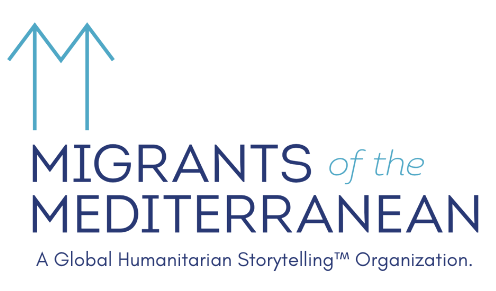Meet Baboucarr
Babou on Lampedusa island, 12 days after being rescued on the Mediterranean Sea. Lampedusa, Italy; 29 April 2017. ©Pamela Kerpius/Migrants of the Mediterranean
by
Pamela Kerpius
Recorded:
28 April 2017
Published:
2017
Meet Baboucarr.
27 years old and from Gambia.
To reach Lampedusa he crossed six countries: The Gambia, Senegal, Mali, Burkina Faso, Niger, and the most dangerous of all, Libya.
His trip took about 4 months in total. He left The Gambia December 26, 2016.
He took a bus in Senegal to Mali. Then another bus to Burkina Faso from Mali. Then, yet another bus from Burkina Faso to Agadez, Niger. In total, it took him one month, 20 days to reach Agadez.
He stayed in Agadez for three weeks as a tailor making clothes in a factory.
He crossed the Sahara desert in the back of a pickup truck with 23 others. He had 5 liters of water, but it was not enough. To survive the four-day trip, some of the other travelers shared their supply of water with him.
“I see human skeletons. I see a lot of things. Even the animals, they are dying in the desert like the rest of the human beings.”
He stayed for 20 days in Sicadim (city name and spelling not verified), where he awaited a driver who never showed up. It was not safe, so he had to hide. Collectively, he and the other travelers pooled their money to buy food and water. Two from the group would travel to the town center daily to acquire their supplies.
He drank well water, which was not clean and made him sick.
He spent one night in Gadro (city name and spelling not verified), a transfer point before his arrival in Sabha, Libya.
Baboucarr stayed in Sabha for two weeks in what he called a “ghetto,” but was probably a typical compound where he was held captive. He says, if you left the compound the guards would cut you, so he stayed put during his stay.
The water he was given was not cleaned or purified for drinking.
He left for Bani Waled and remained there for 11 days. Bani Waled has been described to me in interviews and conversations consistently as one of the worst, if not the worst and most dangerous stop along the Libyan trafficking route.
There were more than 600 migrants held captive in the compound in Bani Waled, in his estimation. It was a “big, big, big compound,” he emphasized. It was comprised of a singular hall where people slept on the floor. The food is minimal: 1 dinar for one piece of bread, otherwise you do not eat. They will take pity on migrants without any money and give them food to survive, but not before they are beaten. Boubacarr was beaten, because it wasn’t everyday that he had money.
Beatings were an everyday occurrence.
Guards will steal cell phones away from migrants if they see them. They do not want anyone to know about where they are or what they are doing, so they cut off communication.
“Everybody is thinking
they’re going to die today.”
He transferred to Tripoli and stayed there in hiding for three days in a compound. There where more than 100 migrants being held in this particular compound. He didn’t eat for two days because there was no food (or none that he could afford). Water was scarce. He did not bathe. He once washed his face.
He went to Sabratha and stayed at the seaside camp for more than a month. The camp is outside, and you sleep out in the open, “It is very cold. Very cold,” he emphasized, and that sometimes you don’t sleep because it’s too cold against the sea air.
The water he had was from the tap, which is pulled from the sea, so it is salty and unfit for drinking. He went to work so he could buy food to eat. He made the risky move of leaving the camp daily for this work, and even then, sometimes his Arab employers would not pay him. He often received water or food in exchange for his services.
His boat left on the sea one evening, but before he reached international waters, he was caught by the Libyan police. The Libyan police cut the boat so it could no longer travel, and he was taken to prison; he was held there for two weeks. There was no food. There was unclean tap water to drink. He escaped and returned to the coast where he stayed for an additional month.
Baboucarr crossed the Mediterranean Sea on a rubber dinghy with 168 people, including 30 women, two of whom were pregnant, and six children.
He said of the experience on the sea at night: “People are crying. You can’t see nothing, only water. Everybody is thinking they’re going to die today.”
He was out at sea for 10 hours before he was picked up by the Guardia Costiera and taken to Lampedusa, arriving 6:00am Easter Sunday, April 16, 2017.
Baboucarr is an amazing human being.

